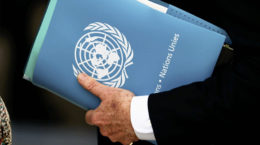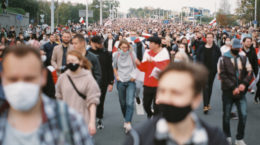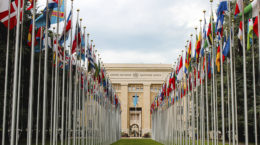International Centre for civil initiatives “Our House” (Nash Dom), Belarus & Lithuania
With support of:
International Fellowship of Reconciliation – Austria
European Bureau for Conscientious Objection
Federation for Social Defence, Germany
The International Peace Bureau (IPB)
Vilnius, in August 2023
Table of Contents
- Summary
- Persecution of Activists and Discrimination of Conscientious Objectors to military service
- “National security panic” caused by the presence of Belarusian migrants in Lithuania
- Discriminatory legislation against Belarusian and Russian citizens in Lithuania under the disguise of “protection of national security”
- Hate speech and negative statements of the president of Lithuania, Gitanas Nausėda, addressed to Belarusians in Lithuania
- Recommendations
- More Information
- References
Summary
The mass pushbacks of non-European migrants at the Belarusian border since 2021 exemplify a broader erosion of asylum rights, refoulement prohibition, and rule of law principles in Lithuania post-2022. Following the 2020 crackdown, Belarusians entered Lithuania on humanitarian visas for safety. After Russia’s Ukraine invasion, Lithuania’s treatment of Belarusian exiles changed. They shifted from perceived regime opponents to security threats.
In early 2023, around 48,804 Belarusians sought refuge in Lithuania due to 2020 protests (1, 2) and war, with about 55,000 residing there by July 2023 (3, 4). Over 1,165 Belarusians were labeled “national security threats” in six months, often based on past army service or attendance at a cadet academy, lacking specific accusations. (5, 6)
Negative decisions on residency applications surged for Belarusians, especially compared to other nationals like Russians, with approximately 300 receiving refusals (7, 8). Belarusians, once supported, are now treated harshly. Ukrainian Film director of the film Mariupol-2, Anna Bilobrova (her fiancé Mantas Kvedaravičius was killed in Ukraine) highlight arbitrary expulsions and security labeling towards Belarussians in Lithuania. “Three years ago, Lithuania supported those who were fighting against the Belarusian regime, but now it treats these people as terrorists,” Bilobrova states (8). The “national security” pretext also targets Belarusian conscientious objectors to military service, halting asylum claims. Detention, limited legal aid, and rights abuses prevail. Human rights violations affect Belarusian objectors and human rights defedenders, attacked by both Belarusian/Russian and Lithuanian authorities.
Because they feel unsafe, Belarusians seek refuge but no longer find it in Lithuania.
1. Persecution of Activists and Discrimination of Conscientious Objectors to military service
Persecution of activists and discrimination of conscientious objectors and those with military service records
Violations of immigration legislation can include mass/arbitrary designation of persona non grata, expulsion, deportation, detention, arbitrariness – no access to rule of law, violation of habeas corpus, or appeal. There are several common features that characterize all cases of Belarusian conscientious objectors’ rights violations in Lithuania:
- The classification of Belarusian conscientious objectors who have previous military service experience or cadet school education (it is worth noting that the decision to attend cadet school was made by parents, not by underage children) as individuals posing a threat to Lithuania’s national security has serious implications. (9, 10, 11, 12) These conscientious objectors are automatically subjected to a 5-year entry ban to all European Union countries. This restrictive policy leaves them with no option to seek refuge in other EU countries to avoid the risk of being mobilized and sent to war in Ukraine (if the Belarusian army is sent to Ukraine). It is essential to recognize that these Belarusian conscientious objectors with past military service experience are already in a vulnerable position. However, Lithuania’s state policy exacerbates their vulnerability, leaving them effectively trapped as hostages of the Belarusian regime and at risk of being exploited for propaganda purposes.
- A ‘threat to national security of Lithuania’ is the only category in Lithuanian legislation where deportation is carried out immediately, without the person’s right to appeal and defend one’s good name and reputation. We believe that such an article is deliberately applied to deprive Belarusian conscientious objectors of their right to protection in Lithuania. The practice has shown that if a Belarusian is deported and unable to provide reasons for staying in Lithuania, the chances of defending oneself and winning a case against the Department of National Security are close to zero. Therefore, depriving Belarusian conscientious objectors of the right to defense in case of deportation becomes a state policy to prevent Belarusian conscientious objectors with previous military service from proving the absurdity of the accusations against them.
- From the court proceedings conducted by Our House, it has become evident that categorizing Belarusian conscientious objectors with previous military service experience as a “threat to Lithuania’s national security” is of a preventive nature. In other words, the Department of National Security acknowledges that these individuals do not currently pose a threat to Lithuania but “may become a threat in the future.” This legal presumption is nonsensical when very harsh sanctions are applied to individuals who have not committed any unlawful acts — they are deprived of employment, residence permits, deported from the country, and subjected to an entry ban to any EU country — all based on the assumption that they might become a threat in some future scenario. This also highlights the legal incompetence of certain Lithuanian institutions and indicates an erosion of Lithuania’s legal system, which requires an immediate response.
- If a Belarusian conscientious objector attempts to defend one’s rights independently, the chances of defending them on his own are also close to zero. This is primarily due to the lack of financial resources to hire lawyers, insufficient proficiency in the Lithuanian language necessary for effective self-defense, and a lack of legal expertise to navigate the complexities of the system. Additionally, with the growing level of xenophobia towards Belarusians in Lithuania, fueled by hate speech from high-ranking Lithuanian politicians in the Lithuanian media, the situation becomes even more challenging.
- There are significant concerns regarding the treatment of Belarusian conscientious objectors with past military service experience who are under investigation or arrested. One alarming issue is the severely restricted access these individuals have to visits from their relatives, friends, and legal representatives (lawyers), even when such visits are officially permitted. The case of Ivan Strashkevich serves as a poignant example. Additionally, there have been instances where crucial documents of significant importance have mysteriously “disappeared” from the cases, raising serious concerns about such practices. Equally troubling is the uncertainty surrounding access to proper medical care for Belarusian conscientious objectors currently held in detention in Lithuania.
- Since the lists of threats to Lithuania’s national security also include former police officers from Belarus, it is essential to clarify that they do not fall under the category of Belarusian conscientious objectors. Additionally, deportation is not such a sensitive issue for them as they are not subject to conscription into the army according to Belarusian legislation. We have tracked the fate of several former police employees who were deported from Lithuania, and all of them have left for Russia.
- As of now, no Belarusian conscientious objector, not even a deserter (desertion in Belarus is punishable by death (13), has been granted political refugee status, despite having also confirmed evidence of their involvement in the 2020 protests. People in Lithuania are in an uncertain status, facing the risk of deportation to Belarus, where they could be subjected to torture and prolonged imprisonment. This situation significantly impacts the mental well-being of the objectors, leaving them in a state of depression and distress. At least two of them have reported to Our House that they experience suicidal thoughts due to this situation.
- All Belarusian conscientious objectors in Lithuania have endured hardships for their commitment to truth and their unwillingness, as Vaclav Havel once said: to live in a lie Despite having the option to deceive Lithuanian migration authorities and conceal their military background, they instead chose the path of honesty towards Lithuania, and it is for this principled stance that they have suffered.
- Men with military service experience in Belarus, who participated in the Belarusian protests of 2020 are perceived as personal enemies and traitors by Alexander Lukashenko and all the power structures. Belarusian force structures refer to them as “rats,” and consequently, when they fall into the regime’s hands, the torture, abuse, and humiliation against these “former” military personnel seeking to start or continue peaceful lives are far more severe and sophisticated than the torture against even political prisoners, which, as we recall, led to the death of several political prisoners. Former military personnel face greater risks of ending up in so-called “sweat box” – prison cell where special inmates engage in collective rape and torture of those placed there by the prison administration. These inmates who reside in the “sweat boxes” will be immediately killed if transferred to regular cells because they have a very bad reputation among prisoners. In the “sweat box”, ordinary prisoners are subjected to continuous rape and beatings, usually lasting for days. When the prison administration takes someone out of there, people are psychologically broken, especially after the sexual assaults, and are unlikely to recover. Exposing Belarusian conscientious objectors with military service experience in the past to the risk of ending up in such a “sweat box” is inhumane and contradictory to human rights.
- We сonsider that the widespread application of the “threat to national security” article in Lithuania against individuals who do not pose a threat is putting an added strain on the entire European security system, including an increase in the number of illegal migrants within the European Union. It also involves political manipulations that must be stopped immediately.
2. “National security panic” caused by the presence of Belarusian migrants in Lithuania
Announcement of “preparation-to-war campaign” by the Minister of the Interior of the Republic of Lithuania – Agnė Bilotaitė, and fear mongering in the Lithuanian society: On January 10, 2023, Lithuania’s Interior Minister launched a basketball-themed campaign to prepare for war, nuclear disasters and other incidents, entitled: “We are a team. We have a plan” (14), which turned into fear mongering and xenophobic sentiments in Lithuanian society under the disguise of preparation for war in Lithuania. In fact, it was an announcement of the Ministry of the Interior’s campaign aimed at forcing Belarusians out of Lithuania. The information campaign is expected to reach one million people in the country with 2,801 million inhabitants, which currently constitutes the majority of the adult population.
According to the Minister of the Interior, the informational campaign of preparation for war should result in people packing a survival bag and having a plan of what they need to do to protect themselves and their family. “Now people are interested and ask if there is a shelter near me. They are interested in how to pack a survival bag and what plan they need to take to protect themselves and their family,” said Bilotatiė. The Minister of the Interior was outraged that “only a fifth have prepared survival bags and only one tenth have a family plan and know what to do”.
Since January, 2023, tensions have been fueled in the Lithuanian media, Lithuanian politicians started using hate language in relation to Belarusians in Lithuania. The situation has an especially strong impact on Belarusian conscientious objectors.
We would like to bring your attention to the fact that the Minister of the Interior of Lithuania, Agnė Bilotaitė, is actively manipulating the notion of the “threat to national security of Lithuania” not only in relation to the Belarusian citizens.
On July 28, 2023, the Minister of the Interior appealed to the president of Lithuania, Gitanas Nausėda, with a request to make a decision to deprive the Russian ice dancer Margarita Drobiazko, who has been representing Lithuania since the breakup of the Soviet Union, of her Lithuanian citizenship. The minister believes that Ms. Drobiazko has not condemned actions of Russia actively enough, because she is friends with Tatiana Navka, the wife of Dmitry Peskov, and performed in a show, organized by Tatiana Navka. According to the Minister of the Interior, those actions of Ms. Drobiazko can be qualified as “threatening the interests of the security of Lithuania or its allies and, thus, damaging the reputation of the country (15).
On June 21, 2023, a number of Lithuanian deputies turned to the Ministry of the Interior with a request to deprive Ms. Drobiazko of the Lithuanian citizenship (16).
a. Discriminatory legislation against Belarusian and Russian citizens in Lithuania under the disguise of “protection of national security”:
At the end of March, 2023, a draft bill appeared at the Seimas of Lithuania, that was aimed at suspending acceptance of applications for Lithuanian citizenship from citizens of Russia and Belarus, evaluation of already filed applications, as well as at banning entry of citizens of Russia and Belarus into the country, banning property purchases, banning the use of electronic signature and imposed a lot of other restrictions. The said draft bill number XIV-1868, nicknamed by people as “Kasčiūnas’s law”, in reality was pushed by three structures: the National Security and Defense Committee of the Lithuanian Parliament, headed by the conservative Laurynas Kasčiūnas, the Ministry of the Interior, headed by the conservative Agnė Bilotaitė, and the Ministry of Foreign Affairs headed by the conservative Gabrielius Landsbergis.
The most publicly active initiator of the bill was Laurynas Kasčiūnas, member of the conservative Homeland Union. According to him, “the fundamental point of reference is that we should put the national security of Lithuania at the first place” (17).
Immediately after that, much more severe measures started to be applied to Belarusians. This year, the number of denied residence permits increased by more than ten times, as the data of the Migration Department shows. According to the information of the Lithuanian press, the majority of those whose residence permits were denied are citizens of Belarus.
Initially, the Kasčiūnas’s law included similar discriminatory provisions in relation to both Belarusian and Russian citizens, the majority of whom are hiding in Lithuania from repressions in Russia and Belarus. Then, after a huge wage of outrage, the bill was mitigated in relation to Belarusians, but a number of discriminatory provisions still remained. (18, 19)
The president of Lithuania vetoed the law, saying that the same measures should be applied to Belarusians, as the official position of Lithuania believes Russia and Belarus to be equally responsible for the invasion of Ukraine. The Parliament almost unanimously overruled his veto.
As a result, the bill was mitigated, arguable provisions creating obstacles for access to citizenship were excluded both for Russian and Belarusian citizens. Now, Russian citizens will still be banned from holding title to real property or to prolong their residence permits, if it’s done without mediation of the MFA – the provision which is not applied to Belarusians. Nevertheless, visas will remain inaccessible for both Belarusian and Russian citizens if applied for without participation of Lithuanian diplomats, which in fact means that visas are practically inaccessible for Belarusian citizens, including close relatives of repressed Belarusians with political asylum in Lithuania that would like to reunite with their family.
“I moved to Lithuania because they [the Lithuanian government] said it was a safe place for Belarusians. If they had not announced that, I would have chosen another country”, said Sviatlana Kubrak, a 21-year-old Belarusian journalist from Vilnius. “Values they had been announcing before, turned out to be super false. They have changed my opinion since 2020”, she added. (17) A huge number of Belarusians of Lithuania share her opinion, as they feel dejected due to the current situation.
On April 21, 2023, the Seimas overrode the president Nausėda’s veto, but that did not stop the language of hatred in the Lithuanian media. Also, the discriminatory law (although in a mitigated form) was passed. Lithuanian media reacted to that situation with titles “Seimas overrode the president’s veto – sanctions for Russians and Belarusians in Lithuania will differ”. As a reminder, we are talking about sanctions against those Belarusians and Russians who fled to Lithuania from criminal regimes. (20)
According to the final approved Lithuanian bill about restrictive measures connected to the military aggression against Ukraine, from May 2, 2023, till May 3, 2024, such opportunities will be restricted for Russian and Belarusian citizens in obtaining Lithuanian visas and getting the status of electronic resident. Additionally, the importation of Ukrainian hryvnia will also be banned.
Citizens of Russia will encounter additional difficulties when entering Lithuania, purchasing real estate, and, their applications for Lithuanian residence permit will be temporarily unaccepted.
The passed bill suspends the receipt of visa applications from citizens of Russia and Belarus, except for the cases when the Ministry of Foreign Affairs of Lithuania is a mediator for visa issuing, therefore making it impossible for Belarusians to obtain a visa (20).
b. Hate speech and negative statements of the president of Lithuania, Gitanas Nausėda, addressed to Belarusians in Lithuania:
On March 28, 2023, the counselor of Nauseda pronounced the position of the president of Lithuania: “What we cannot afford is to politically differentiate between Russia and Belarus, saying that one state is more aggressive than the other, or send some other bad signal to the world”.
On April 14, 2023, the president of Lithuania, Gitanas Nausėda, vetoed the bill passed by the Seimas a week before the national sanctions against citizens of Russian and Belarus. The head of the state suggested to parliamentarians to hold onto a unified position and make legal restrictions equal in regard to both Russians and Belarusians.
On April 21, 2023, Nauseda noted that: “foreign policy of Lithuania is based on the principle that both Russia and Belarus are aggressors and bear the same responsibility for horrors in Ukraine”. “Therefore, it seems inconsistent to me that when we are speaking about possible sanctions against citizens and people, we point out these two countries and say that one country must be punished 100 percent, while the other in a restricted manner”, the president of Lithuania said.
In reality, Nauseda is speaking about sanctions against Belarusians who are running to Lithuania from the Belarusian regime, but he diligently equates the participants of the Belarusian democratic movement to the regime of Lukashenka. (21)
Since March 2023, Nauseda has been constantly suggesting unifying sanctions and discrimination against Belarusians and Russians of Lithuania and making the discriminatory law more severe.
On June 25 2023, under the chairmanship of the president of the Republic of Lithuania, Gitanas Nausėda, a meeting of the State Defence Council was held to discuss disturbances in Russia and their consequences for the national security of Lithuania. Nauseda called to strengthen the check ups of Belarusians, as well as to return to the already made suggestion to apply the procedure of individualized additional verification not only of the citizens of Russia, but also of Belarus. (22, 23)
On July 4, 2023, the president of Lithuania, Gintanas Nauseda, made a statement about the necessity to equalize the discriminatory legislative provisions against Belarusians and Russians in Lithuania. The president of Lithuania said that since the Seimas of Lithuania overruled the veto on legal restrictions concerning Belarusians in Lithuania, it would lead to the arrival of the Wagner group to the country.
Nauseda’s highly illogical statement about Belarusians of Lithuania (who have generally escaped from repressions of the regime of Lukashenka): “since the veto [against Belarusians of Lithuania, who have escaped from reprisals – our note] was overruled, there is a risk that Wagner mercenaries with Belarusian citizenship can appear on the borders of Lithuania”. (24) The interrelation between Belarusians fleeing to Lithuania and a possible Belarusian citizenship of the PMC Wagner mercenaries is not obvious to anyone, except for the president Nauseda. He made an attempt to explain his thought in the Lithuanian media: “Let’s remember, the president vetoed the bill, establishing and saying that we should apply a similar legislative regime to those arriving from both Russia and Belarus [running from reprisals of the Russian and Belarusian regimes – our note]. I would say, that the ruling majority has gloatingly overruled that veto; well, now they are left at the bottom of the ladder”.
Recommendations
- We need a humanitarian corridor to Europe for Belarusian conscientious objectors and to stop and prevent their deportations and putting them on “persona non grata” lists in Lithuania. We need a solution for the issue of their status in the European Union / Lithuania.
- Neither encourage nor stimulate the illegal migration of the Belarusian conscientious objectors, which would create additional risk situations for them and for European security too. As of today, the European Union, represented by Lithuania, is sending Belarusian conscientious objectors back to Belarus with a ban on entry to the European Union for the term of 5 years, which is making their situation much worse. We still do not know how many Belarusian conscientious objectors, that have already been deported, are currently imprisoned in Belarus. However, we do know that having received a ban on entry to the European Union and being under risks of deportation, part of the Belarusian conscientious objectors unwillingly chooses to stay in the territory of the European Union illegally. In such a situation, they can become easy targets for the blackmailing by the KGB due to their vulnerability and fear of arrest and deportation back to Belarus.
- We need a support of the system of security of human rights defenders and peacebuilders, like, e.g., Our House, to organize support and control over the Belarusian conscientious objectors. Therefore, we suggest, that Our House would take tutorship, or guardianship and supervision over Belarusian conscientious objectors, work with them, learning thus their situation, so that in case of any attempts of agents’ infiltration, Our House could immediately inform the competent authorities.
More Information
- The International Peace Bureau’s Nobel Peace Prize Nominees: https://www.ipb.org/the-international-peace-bureauipb-has-announced-its-intention-to-nominate-three-remarkable-organizations-with-a-focus-on-the-right-to-conscientious-objection-for-the-2024-nobel-peace-prize/
References
1. “In Lithuania, Nearly 100,000 Ukrainians and 50,000 Belarusians Reside Already”, Delfi (https://www.delfi.lt), 16 January 2023, https://www.delfi.lt/ru/news/live/v-litve-prozhivayut-uzhe-pochti-100-000-ukraincev-i-50-000-belorusov-92284243
2. Anastasia Luzgina, Vladislav Koreyvo, “Analysis of the Migration Flow from Belarus to Poland, Lithuania, and Other European Union Countries in 2021-2022” (Pages 5-8), Beroc Economic Research Centre (https://beroc.org/en/), 2023, https://beroc.org/upload/medialibrary/39e/39e10070c02bd21e582e4858465018a4.pdf
3. “Deputy Warns: A Large Number of Belarusians Are Moving Through Lithuania, This Can Be Exploited” Delfi (https://www.delfi.lt), 9 August 2023, https://www.delfi.lt/ru/news/politics/deputat-preduprezhdaet-cherez-litvu-peremeshchaetsya-bolshoe-kolichestvo-belorusov-etim-mozhno-vospolzovatsya-94160917
4. “How Many Residence Permits Has Lithuania Already Issued to Belarusians in 2023?”, Charter-97 (https://charter97.org), 11 August 2023, https://charter97.org/ru/news/2023/8/11/559282/
5. “Lithuania Declares More Than 1,000 Belarusians And Russians To Be National Security Risks”, RadioFreeEurope Radio Liberty (https://www.rferl.org), 4 August 2023, https://www.rferl.org/a/lithuania-belarusians-russians-national-security-risk/32534400.html
6. Benas Gerdžiūnas, “‘I don’t feel safe anymore.’ Belarusians in Lithuania – yesterday’s friends, today’s foes?”, New Eastern Europe (http://europe.eu) 27 June 2023, https://neweasterneurope.eu/2023/06/27/i-dont-feel-safe-anymore-belarusians-in-lithuania-yesterdays-friends-todays-foes/
7. Thomas Valkauskas, “Drivers from Belarus and Russia Less Frequently Renewing Residence Permits in Lithuania: How Foreigners are Checked and How it Affects the Lithuanian Freight Transport Business”, Russian Service of Radio LRT, Lithuanian National Radio and Television (LRT) media group (https://www.lrt.lt/), 14 April 2023, https://www.lrt.lt/ru/novosti/17/1962447/voditeliam-iz-belarusi-i-rossii-v-litve-rezhe-prodlevaiut-vnzh-kak-proveriaiut-inostrantsev-i-kak-eto-vliiaet-na-litovskii-biznes-gruzoperevozok
8. Jurga Bakayte, “Over Three Hundred Belarusian Citizens Did Not Receive Residence Permits in Lithuania: Is ‘Correct’ Completion of the New Form the Main Factor?”, Lithuanian National Radio and Television (LRT) media group (https://www.lrt.lt/), 19 Мау 2023, https://www.lrt.lt/ru/novosti/17/1992969/bolee-triokhsot-grazhdan-belarusi-ne-poluchili-vnzh-v-litve-iavliaetsia-li-pravil-noe-zapolnenie-novoi-ankety-osnovnym-faktorom
9. “Sudden Revocation of Residence Permits for Several Wargaming Employees in Lithuania. Details Uncovered”, edition “Zerkalo” (https://news.zerkalo.io/), 20 July 2023, https://news.zerkalo.io/life/44230.html
10. “Residence Permits in Lithuania Could Be Revoked for More Than Just Contracted Service: New Details”, Dev.by (https://devby.io), 22 July 2023, https://devby.io/news/vnzh-v-litve-mogut-lishit
11.”He Was a Guard”: Stories of Belarusians Deemed Dangerous for Lithuania”, edition Nasha Niva (https://nashaniva.com),11 August 2023, https://nashaniva.com/ru/323736
12. “At the Refugee Camp, There Was No Desire to Sleep or Eat”: Former Belarusian Border Guard Deemed Dangerous in Lithuania Handed Over to Poland”, edition “Zerkalo” (https://news.zerkalo.io/), 2 August 2023, 2023https://news.zerkalo.io/life/45248.html
13. The law “On Amendments to the Codes on Criminal Liability”, National Legal Internet Portal of the Republic of Belarus, 14 March 2023, https://pravo.by/document/?guid=3961&p0=H12300256
On March 14, 2023, the law “On Amendments to the Codes on Criminal Liability” was published on the National Legal Internet Portal of Belarus. The amendments to the criminal liability codes, which include the death penalty for officials and military personnel convicted of state treason, as well as criminal liability for terrorism propaganda and discrediting the army, will come into effect from March 25, 2023.The main goal of the document is noted as “strengthening the counteraction to extremist (terrorist) and anti-state crimes.”Criminal liability for “state treason” committed by a public official extends to all individuals holding government positions. Moreover, for “state treason” committed by a public official or military serviceman, the possibility of imposing the exceptional punishment of the death penalty is introduced.The law introduces criminal liability for “propaganda of terrorism, discrediting the armed forces, other troops and military formations, militarized organizations, and violation of requirements for protecting state secrets.” The detention period for individuals suspected of committing state treason, conspiracy, or other actions aimed at seizing state power, espionage, and clandestine activities is increased from three to ten days.
14. “Lithuania launches campaign to prep society for war, crises”, Lithuanian National Radio and Television (LRT) media group (https://www.lrt.lt/), 10 January 2023, https://www.lrt.lt/en/news-in-english/19/1863164/lithuania-launches-campaign-to-prep-society-for-war-crises
15. ” Minister appeals to president to strip ice dancer Drobiazko of Lithuanian citizenship”, Lithuanian National Radio and Television (LRT) media group (https://www.lrt.lt/), 28 July 2023, https://www.lrt.lt/en/news-in-english/19/2045571/minister-appeals-to-president-to-strip-ice-dancer-drobiazko-of-lithuanian-citizenship
16. “Lithuanian parliament moves to strip ice dancer Drobiazko of citizenship over performing in Russia”, Lithuanian National Radio and Television (LRT) media group (https://www.lrt.lt/), 21 June 2023, https://www.lrt.lt/en/news-in-english/19/2017908/lithuanian-parliament-moves-to-strip-ice-dancer-drobiazko-of-citizenship-over-performing-in-russia
17. Benas Gerdžiūnas, “I No Longer Feel Safe”: Belarusians in Lithuania – Yesterday’s Friends, Today’s Enemies?”, Lithuanian National Radio and Television (LRT) media group (https://www.lrt.lt/), 2 May 2023, https://www.lrt.lt/ru/novosti/17/1975226/ia-bol-she-ne-chuvstvuiu-sebia-v-bezopasnosti-belorusy-v-litve-vcherashnie-druz-ia-segodniashnie-vragi
18. “Lithuania’s President Vetoes Sanctions Law against Russians and Belarusians: Proposes Equalizing Restrictions and Simplifying Visa Revocation”, edition “Current Time” (https://www.currenttime.tv), 14 April 2023, https://www.currenttime.tv/a/nauseda-veto/32364008.html
19. “The Seimas of Lithuania to Decide Not to Apply Restrictions on Lithuanian Citizenship to Russian and Belarusian Nationals”, MIGRATION LAW CENTER (http://www.migration.lt/), 4 April 2023, https://www.migration.lt/the-seimas-of-lithuania-to-decide-not-to-apply-restrictions-on-lithuanian-citizenship-to-russian-and-belarusian-nationals
20. “Seimas Overrides President’s Veto – Sanctions for Russians and Belarusians in Lithuania Will Differ”, Lithuanian National Radio and Television (LRT) media group (https://www.lrt.lt/), 21 April 2023, https://www.lrt.lt/ru/novosti/17/1967144/seim-preodolel-veto-prezidenta-sanktsii-dlia-rossiian-i-belorusov-v-litve-budut-otlichat-sia
21. “Nauseda Considers the Possibility of Proposing Unified Sanctions for Russians and Belarusians”, Lithuanian National Radio and Television (LRT) media group (https://www.lrt.lt/), 6 April 2023, https://www.lrt.lt/ru/novosti/17/1957694/nauseda-rassmatrivaet-vozmozhnost-predlozhit-unifitsirovat-sanktsii-dlia-rossiian-i-belorusov
22. “At the Focus of the State Defense Council: Unrest in Russia and the Situation in Belarus”, President of the Republic of Lithuania (https://www.lrp.lt/lt), 25 June 2023, https://www.lrp.lt/ru/press-centr/novosti/v-centre-vnimanija-gosudarstvennogo-soveta-oborony-besporjadki-v-rossii-i-situacija-v-belarusi/40688
23. “Nauseda Calls for Revisiting the Proposal of Individualized Additional Checks for Both Russians and Belarusians”, edition “Zerkalo” (https://news.zerkalo.io/), 26 June 2023, https://news.zerkalo.io/economics/42305.html?c
24. “Lithuanian President Reminds About the Desire to Equalize Restrictions for Russians and Belarusians”, Delfi (https://www.delfi.lt), 4 July 2023, https://www.delfi.lt/ru/news/politics/prezident-litvy-napomnil-o-stremlenii-uravnyat-ogranicheniya-v-otnoshenii-rossiyan-i-belorusov-93838619










